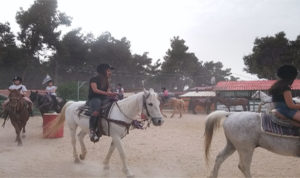Helping At-Risk Girls in Israel
The small city of Tzfat, Israel, perched high up on the Upper Galilee Mountains, is known for the Golden Age of its 16th century, Kabbalists and Torah luminaries. Today, with a population of some 22,000, the newer neighborhoods are home to a large mix of families who emigrated from North African countries shortly after Statehood. Tzfat is also home to two large Absorption Centers which still actively house Ethiopian immigrants. Additionally, Tzfat in the last few years has been a settlement site of scores of immigrants hailing from the ‘Bnei Menashe’ tribe, formerly living in the northeastern border of India. This ‘Ingathering of the Exiles’ is very much a reality of life in Israel today. Not all of these disparate immigrant groups transition into their new lives so smoothly. Women and children are often victims of dysfunctional families, the direct result of unemployment, marital stress, and emotional and economic instabilities.
 Israel’s welfare and social services predominantly grapple with these issues. And even Tzfat, with its Shangri la atmosphere in the Old City, is not immune to these stresses. In fact, it suffers more being in the social and geographic periphery of the country, out of the line of vision of government and private foundations, which favor the glamour of giving aid to prominent organizations in the larger cities.
Israel’s welfare and social services predominantly grapple with these issues. And even Tzfat, with its Shangri la atmosphere in the Old City, is not immune to these stresses. In fact, it suffers more being in the social and geographic periphery of the country, out of the line of vision of government and private foundations, which favor the glamour of giving aid to prominent organizations in the larger cities.
‘Alice’s House’ was opened by the Shaalim Network several years ago in Tzfat, in cooperation with the Municipality’s welfare department, as a shelter for At-Risk Teen Girls. It is one of seven At-Risk ‘homes’ it has created in different locations in the country. The ‘Home’ in Tzfat is limited to 15 young girls, aged 13-16. The girls come directly after their school day (1:00 pm) and are given a nutritious hot lunch. The atmosphere is warm and supportive, and they spend the afternoon engaged in therapeutic and enriching activities. The staff includes a social worker, program director, and an 18-year old, doing her National Service. Daily, the girls are given help with their homework and school projects, career counselling and personal guidance.
Therapeutic Horseback Riding has been well documented for bringing out much desired outcomes among At-Risk Teens and other groups. People who were not in trusting relationships, learn to trust; those with low self-confidence, discover their inner strengths and abilities; those with anxieties find the horses to be calming and great fun. This program was NOT in the budget of ‘Alice’s House,’ but a grant from the Women of Vision Society, and others, has helped to change this.
People who were not in trusting relationships, learn to trust; those with low self-confidence, discover their inner strengths and abilities; those with anxieties find the horses to be calming and great fun.
On a recent visit to ‘Alice’s House,’ I spoke to Liraz. The young girl graciously took her eyes off her cell phone to meet mine for a fleeting moment when I spoke to her. She was at ‘Alice’s House’ last year, when funds were found to provide the girls with a just a few sessions of Therapeutic Horseback Riding. She said, repeatedly that the riding was ‘keyf retzach.’ Okay, there was indeed some 50 years difference in our ages, but I had never encountered this phrase before, which literally means, ‘murderously fun.’ She said that it helped her overcome some of her fears. Then I spoke with Gaya, whom I had been told about. She too was in the very limited program the year before, and suffers from a wide range of anxieties. She was initially petrified of the horses, but told me that the horses were somehow sensitive to her fears and helped to calm her, bringing about greater self-confidence which carried over to other aspects of her life. The social worker had told me, even before I met Gaya in person, that she underwent a significant improvement in coping with her anxieties, after her limited course.
Across the lounge, I was pleasantly surprised to hear two young girls chattering away in English. I approached them and asked them their names, and informed them that money was secured to continue to provide a Therapeutic Horseback Riding Course. Devorah was so happy to hear this. She was familiar with this therapy from another framework, and she said, “it made me forget about the bad stuff.” She said it helped her learn to cope. Yemima, the second girl, was convinced she would be afraid to get up on a horse, but Devorah was assuring her otherwise, that it was ‘the best fun.’
Again, I would like to express our gratitude to the Women of Vision at the Jewish Foundation of Greater New Haven for your gift which will go towards the cost of providing a Therapeutic Horseback Riding Course to these 15 young women. Just imagine the impact you are having on their young lives – they will each be positively transformed, and emotionally strengthened to face the challenges of their lives. It is a gift that they will carry with them always. What a priceless investment in the future of these brave Israeli young women!
Submitted by Tzivia Polsky, Resource Development, Shaalim Network in Israel.
